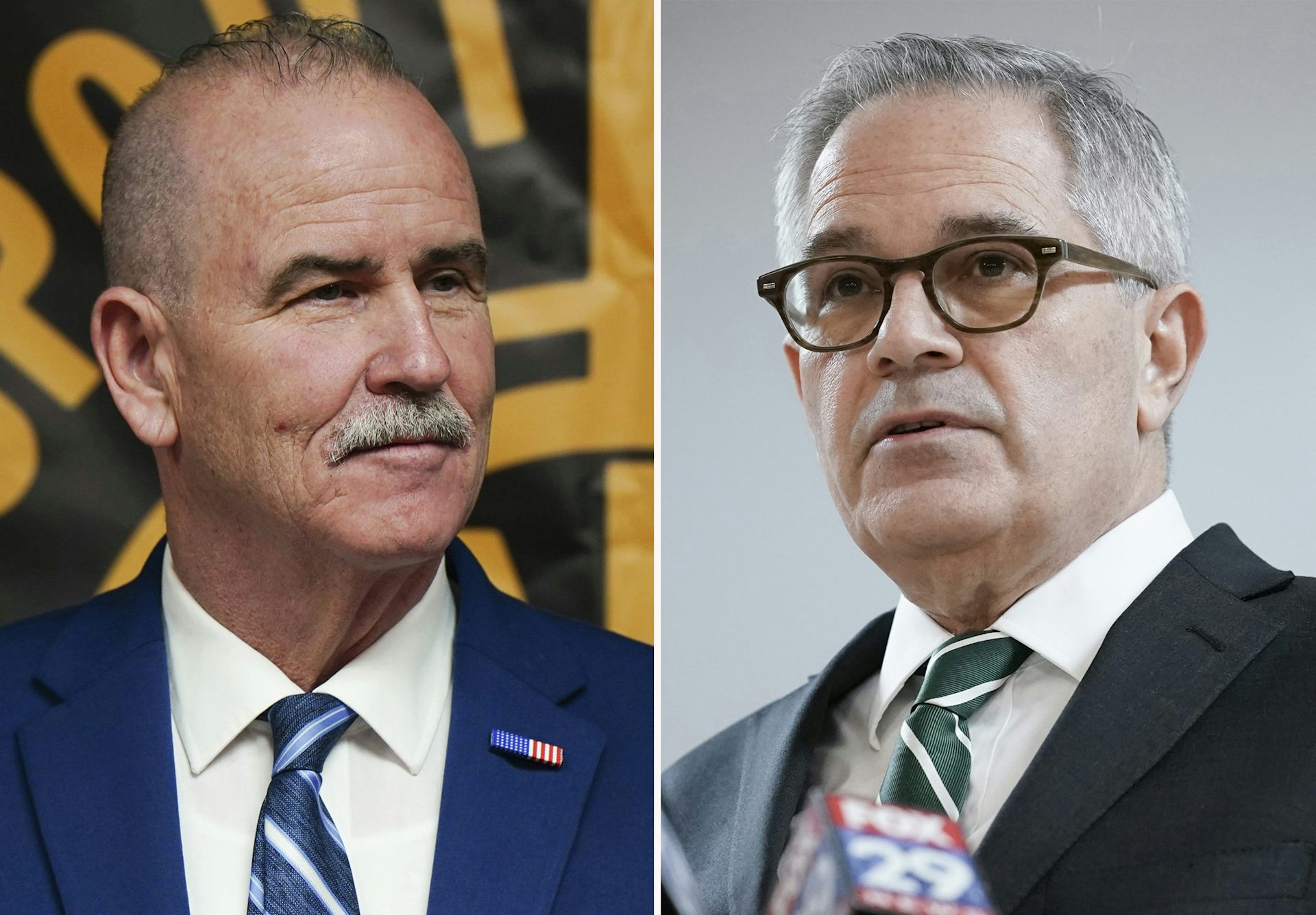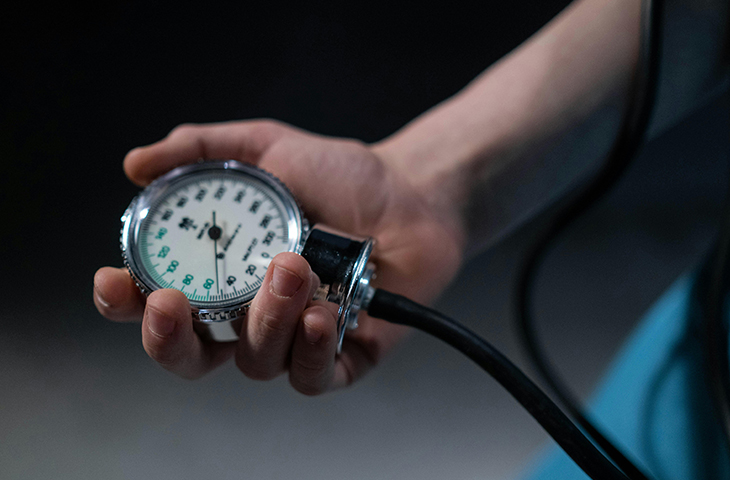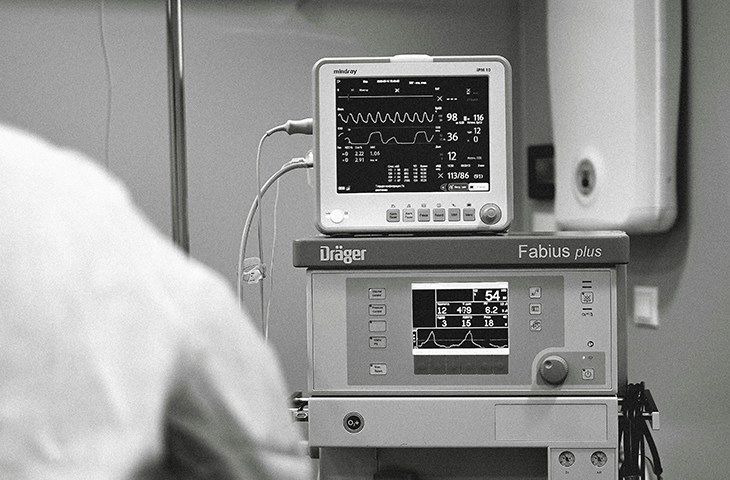Philadelphians Will Soon Choose Their Next District Attorney − So What Do Das Actually Do?

Will Larry Krasner, right, win a third term? Or will fellow Democrat Pat Dugan replace him? Jessica Griffin/The Philadelphia Inquirer, left, and AP/Matt Rourke, right, via AP Photo
Philadelphia’s race for district attorney is one to watch in this odd-year election cycle, when there are neither national nor state elections in Pennsylvania, so turnout will undoubtedly be quite low.
Incumbent Larry Krasner faces a competitive Democratic primary race against Pat Dugan, a retired municipal judge. Voters will decide on May 20, 2025.
Krasner gained national attention when he originally ran as a “progressive prosecutor” in 2017 and received financial support from liberal financier and philanthropist George Soros.
Once elected, he was, as I wrote in my book “Reforming Philadelphia, 1682-2022,” “arguably the most liberal DA in the city’s history, who campaigned on never pursuing the death penalty, ending cash bail, and seeking alternatives to incarceration.”
Dugan, meanwhile, previously served not only as a municipal judge but also as president judge. This means that the other municipal court judges elected him to lead both the criminal and civil divisions of the court.
Either Krasner or Dugan will become the city’s next district attorney, since there’s no Republican or independent candidate running.
So what do district attorneys do anyway?
Chief law enforcement officers
District attorneys are often called the “chief law enforcement officer” of an area, typically a county. Their office is responsible for charging and prosecuting – or deciding not to prosecute – people arrested for crimes in that county.
Yet the DA does not lead the police.
The police are typically a separate office under the mayor that is responsible for “keeping the peace,” with the power to arrest people suspected of committing crimes.
Attorneys working for the DA’s office decide, based on police reports and potentially other evidence, whether to charge an arrested person for a crime and what crime they should be charged with.
The DA’s office then seeks to convince a criminal court judge of the guilt of the person charged with the crime.
 Larry Krasner, who was first elected in 2017, is running for a third term.
AP Photo/Matt Rourke
Larry Krasner, who was first elected in 2017, is running for a third term.
AP Photo/Matt Rourke
Elected and independent
Critically, district attorneys are elected. They are independent of and separate from the mayor, who oversees the police. In fact, the DA’s office can disagree with the mayor’s office on policy issues related to law enforcement – yet they still have to work together.
It’s a form of divided government and checks and balances, and some policy differences are evident in the relationship between Krasner and Philadelphia Mayor Cherelle Parker.
For instance, Krasner has argued for harm-reduction programs such as needle exchanges and supervised injection sites to deal with the city’s opioid addiction crisis. Yet the Parker administration eliminated city funding for needle exchange programs in its 2025 budget.
Officials of the state
The fact that DAs typically work for a county is also important. Unlike cities or towns, counties are administrative subunits of states. So DAs are state law enforcement officers.
Philadelphia is the only consolidated city and county in Pennsylvania, meaning the city and the county have the same geographic boundaries and their governments have for the most part been combined.
The powers, duties and responsibilities of the district attorney’s office are not specified in the Philadelphia Home Rule Charter, but rather in the Pennsylvania Consolidated Statutes.
The purpose of having DAs as state officers responsible for their respective counties is that it provides some uniformity in law enforcement across the state. This is pretty important considering the potential severity of criminal charges, which in Pennsylvania can include the death penalty.
It is important to note, however, that Pennsylvania also divides its counties into nine separate “classes” based on population. Different conditions apply to each class.
With over 1.5 million residents, Philadelphia is the state’s only first-class county. It is also unique in terms of the DA’s workload, both because of the county’s population size and its high arrest rate.
The sheer volume of crimes that can be prosecuted makes the Philadelphia DA’s office important from a policymaking perspective.
Discretionary powers
District attorneys do not make criminal laws. But each DA has significant discretion over where they focus the attention of their attorneys.
Approximately 300 assistant DAs and 600 total staff, including other attorneys, work under Krasner.
DAs decide what kind of attorneys they hire to serve as assistant DAs. For example, they decide whether those attorneys have a more progressive or a more traditional law-and-order philosophy. When Krasner became DA, some personnel left and other staff members were terminated. This provided the new DA plenty of opportunities to hire new people.
DAs also have significant discretion when it comes to whether to charge a person with crimes and what crimes to charge them with.
Krasner, for example, decided in 2018 to not charge people for marijuana possession. He also instructed his team to not charge sex workers arrested for prostitution. And, for a time, he reduced the charges against shoplifters if the stolen goods were valued under US$500, making it a less serious offense.
Krasner’s lenient approach to petty crimes is the basis for one of Dugan’s chief criticisms: that the DA is responsible for the increase in shoplifting in Philadelphia. Major retailers, most notably the Wawa convenience store chain, have cited theft as the reason they closed stores in the city.
For his part, Krasner notes that he established a retail theft task force in 2024 and now treats thefts under $500 as more serious offenses.
 Locked cases are a familiar sight at pharmacies in Philly, where retail theft has spiked in recent years.
Jumping Rocks/Universal Images Group via Getty Images
Locked cases are a familiar sight at pharmacies in Philly, where retail theft has spiked in recent years.
Jumping Rocks/Universal Images Group via Getty Images
Alternatives to incarceration
In line with these discretionary powers, DAs may also set up special initiatives such as diversionary programs that offer alternatives to both conviction and incarceration.
For instance, a diversionary program that Krasner expanded is one for juvenile offenders who have stolen cars. Instead of being charged with a crime, the young people are put into a five-week program that teaches decision-making and other life skills.
Dugan has also been active in the diversionary space and had a prominent role in establishing a Veterans Court in Philadelphia in 2010. The Veterans Court recognizes the unique problems faced by many veterans, particularly when it comes to substance use and mental health problems, and tries to divert them away from the criminal justice system and toward treatment, while also lessening the burden on the traditional criminal court system.
Read more of our stories about Philadelphia.
Richardson Dilworth does not work for, consult, own shares in or receive funding from any company or organization that would benefit from this article, and has disclosed no relevant affiliations beyond their academic appointment.


